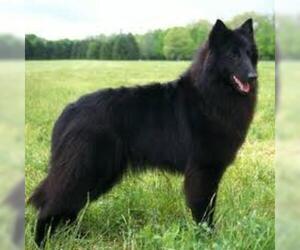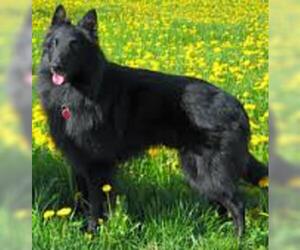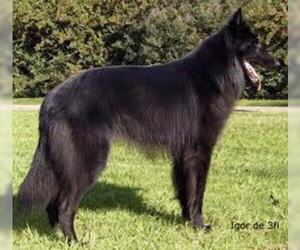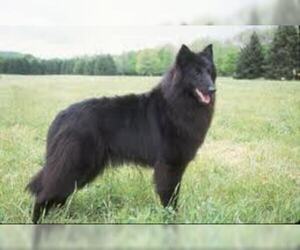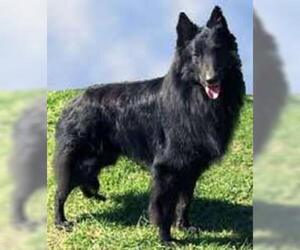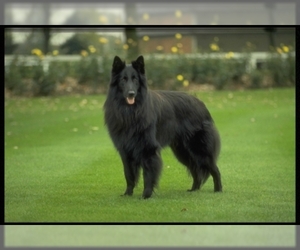
All about Belgian Sheepdog dog breed
A.K.A. :Groenendael, Chien de Berger Belge, Belgian Shepherd Dog, Groenendael, Groenendael Belgian Shepherd, Belgian Groenendael, Groenendael Dog, Groenendael Shepherd, Belgian Groenendael Shepherd, Groenendael Berger Belge
Size
Grooming requirements
Exercise requirements
Good with other dogs
Watchdog ability
Energetic
Training requirements
Playful
Affectionate
Good with other pets
Good with children
Good with strangers
Winter
Summer
Healthiness
Protective
Life Span
| Pure Breeds | Member |
| Breeds A - Z | B |
| Breeds by Group | Herding |
| Breeds by Trait | Good With Kids High Stamina Dog Breeds Smartest Dog Breeds |
| Overview: | The Belgian Sheepdog, also known as the Groenendael, is a captivating and intelligent breed originating from the pastures of Belgium. These medium-to-large dogs are instantly recognizable by their elegant, long, black double coat, which is dense and weather-resistant, requiring regular grooming to prevent matting. Physically, they possess a strong, athletic build, with an alert and expressive face, often described as having an intelligent gaze. Temperamentally, Belgian Sheepdogs are known for their loyalty, intelligence, and protective instincts. They form strong bonds with their families and are excellent companions for active households, thriving on mental and physical stimulation. While generally good with children and other pets when properly socialized, their high energy levels and need for space make them less suitable for small apartments. Potential owners should also be aware of common health considerations such as hip and elbow dysplasia, progressive retinal atrophy, and epilepsy. With consistent training and plenty of exercise, the Belgian Sheepdog proves to be a devoted and rewarding family member. |
F.A.Q.
All You Need to Know About the Belgian Sheepdog Breed
The Belgian Sheepdog, or Groenendael, is a stunning, intelligent breed originating from Belgium, known for its elegant black coat and alert demeanor. These versatile dogs possess a strong desire to please, making them highly trainable and excellent companions for active individuals or families. Physically, they are medium-to-large with a proud carriage and expressive eyes. Temperamentally, they are loyal, protective, and sometimes reserved with strangers, requiring early socialization. Due to their high energy levels and need for mental stimulation, the Belgian Sheepdog thrives in homes with ample yard space and is not well-suited for apartment living without significant daily exercise. They require regular grooming to maintain their luxurious double coat and consistent exercise to prevent boredom. While generally healthy, potential adopters should be aware of common health concerns like hip and elbow dysplasia. With proper training and care, the Belgian Sheepdog makes a devoted and loving family member.The average weight for a Belgian Sheepdog is between 45 and 75 pounds. Adult males typically weigh 55-75 pounds, while females usually range from 45-60 pounds. This makes them a medium to large-sized breed. Maintaining a healthy weight for a Belgian Sheepdog is crucial for their overall well-being.
Belgian Sheepdog Height: Understanding the Average Size and How Tall is a Belgian Sheepdog?
When considering a Belgian Sheepdog, one of the common questions revolves around their size. These elegant and athletic dogs are known for their medium to large stature. The average height of a Belgian Sheepdog, measured at the shoulder (withers), typically falls within a specific range for adult males and females.For adult male Belgian Sheepdogs, you can expect an average height of about 24 to 26 inches (61 to 66 cm) at the shoulder. Adult female Belgian Sheepdogs are generally a bit smaller, with an average height ranging from 22 to 24 inches (56 to 61 cm) at the shoulder.Therefore, the overall average height of a Belgian Sheepdog is approximately 22 to 26 inches at the shoulder.It's important to remember that these are average ranges. Individual genetics and nutrition can lead to some variation. While most will fall comfortably within these dimensions, you might encounter a slightly taller or shorter individual. Regardless, understanding the typical Belgian Sheepdog height will help you prepare for the space and presence this magnificent breed brings to your home!The Belgian Sheepdog colors are primarily solid black, which is the only AKC recognized Belgian Sheepdog color. While the American Kennel Club (AKC) only accepts solid black for the Belgian Sheepdog (also known as the Groenendael), some other variations exist.Occasionally, you might see rare coat types such as a small amount of white on the chest, toes, or chin, which is typically tolerated but not preferred in show rings. Exotic Belgian Sheepdog variations like brindle, fawn, cream, or sable coats are not recognized by the AKC for the Belgian Sheepdog, as these colors are characteristic of the other Belgian Shepherd varieties (Tervuren, Malinois, and Laekenois).Furthermore, extremely rare or exotic variations such as blue, lilac, merle, or chocolate are not found in purebred Belgian Sheepdogs and would indicate mixed parentage if present. Potential adopters and buyers should be aware that any Belgian Sheepdog advertised with colors other than solid black is likely not purebred or deviates significantly from the breed standard, which can impact pricing and eligibility for AKC events.
Belgian Sheepdog Personality & TemperamentThe Belgian Sheepdog personality is characterized by a high degree of intelligence, loyalty, and a strong work ethic. They form deep bonds with their families, often described as "velcro dogs" due to their desire to be constantly near their loved ones. These dogs are generally friendly and sociable with people they know, but can be reserved or watchful around strangers, making them excellent natural protectors. Their loyalty is unwavering.While highly adaptable, the temperament of Belgian Sheepdog is not ideal for apartment living unless their significant exercise and mental stimulation needs are consistently met. They thrive in homes with yards and active owners who can engage them in training, sports, or long walks.With children, Belgian Sheepdogs can be wonderful companions, especially if raised with them. They are often patient and protective, but due to their herding instincts, supervision is always recommended, particularly with very young children. Early socialization and training are crucial for ensuring positive interactions.Regarding other pets, Belgian Sheepdogs can coexist peacefully with cats and other dogs, particularly if introduced during puppyhood and properly socialized. However, their strong prey drive and herding instincts mean that introductions should always be managed carefully. They are highly intelligent and trainable, making them rewarding companions for experienced dog owners who can provide consistent guidance and mental engagement.
The Belgian Sheepdog temperament is marked by intelligence, attentiveness, and a strong desire to be involved with their family. They are known for being exceptionally loyal and protective, forming deep bonds with their owners. While generally friendly with their own family, they can be reserved or watchful around strangers, making early socialization crucial. They are highly sociable within their pack, craving companionship and can be prone to separation anxiety if left alone for extended periods.
Their natural herding instincts mean they are often good with children, viewing them as part of their flock to be watched over, but supervision is always recommended, especially with very young children. With other pets, especially those they are raised with, they can coexist peacefully, though their strong prey drive might require careful introductions to smaller animals. Apartment living is generally not ideal for this active breed; they thrive in homes with ample space and a securely fenced yard. They possess a keen desire to please, making them highly trainable, but they can also display a degree of stubbornness if they don't see the point of a command. This breed is also quite sensitive, responding best to positive reinforcement and gentle handling rather than harsh corrections. They are excellent problem-solvers and need consistent mental and physical stimulation to prevent boredom and destructive behaviors. As a vigilant and devoted companion dog, the Belgian Sheepdog requires an owner committed to their needs for exercise, training, and affection.Belgian Sheepdog Care & Daily MaintenanceGrooming: The Belgian Sheepdog has a thick, double coat requiring regular brushing (2-3 times weekly) to prevent mats and reduce shedding. Expect heavier shedding seasonally. Occasional baths are sufficient.Exercise: Despite their appearance, Belgian Sheepdogs are not a low-energy dog breed. They require significant daily exercise, including long walks, runs, or engaging play sessions (at least 60-90 minutes per day) to prevent boredom and destructive behaviors. Mental stimulation through training and puzzle toys is also crucial.Dietary Considerations: Feed a high-quality, balanced diet appropriate for their age, size, and activity level. Monitor food intake to prevent obesity, as weight management is important for this breed's overall health. Consult your vet for specific dietary recommendations.Health & Hygiene: While not brachycephalic, regular ear cleaning is essential to prevent infections. Daily dental care (brushing) is vital to prevent periodontal disease and maintain good oral health. Skin issues can sometimes occur, so regular coat checks for redness, irritation, or parasites are recommended.Climate Sensitivity: Belgian Sheepdogs tolerate cold well due to their double coat but can overheat in hot weather. Provide ample shade and fresh water during warmer months, and limit strenuous exercise during peak heat.Common Health Concerns: Beyond dental and potential skin issues, reputable breeders screen for hip and elbow dysplasia, eye conditions, and certain cancers. Regular veterinary check-ups are essential for early detection and health tips for Belgian Sheepdog longevity.
The Belgian Sheepdog activity level is generally moderate to high. These intelligent and athletic dogs possess a good balance of energy, typically enjoying short bursts of intense activity followed by periods of rest. They are not brachycephalic; this is a common misconception. Belgian Sheepdogs have a standard muzzle length, which means they do not face the same respiratory limitations as brachycephalic breeds. Their exercise needs are significant, requiring at least 60-90 minutes of dedicated activity daily. This can include brisk walks, jogging, hiking, or off-leash play in a secure area. They excel in dog sports like agility, obedience, and herding, which provide both physical and mental stimulation. Belgian Sheepdogs love interactive playtime, whether it's fetching, tug-of-war, or solving puzzle toys. While they enjoy active outings, they are also content to relax indoors with their family after their exercise requirements are met. They are suitable for active families who can commit to their exercise demands and engage them mentally. They are not recommended for low-energy households that cannot provide adequate stimulation, as this can lead to boredom and potentially destructive behaviors. Understanding how active are Belgian Sheepdog is crucial for potential owners to ensure a harmonious living situation.
Breed Breakdown: What Experts Say About the Belgian Sheepdog
I would rate the "Size" trait of the Belgian Sheepdog a 7.This rating reflects that the Belgian Sheepdog is a moderately large to large breed. While not as massive as a Great Dane or a Mastiff, they are considerably larger and more substantial than the average companion dog like a Beagle or a Shih Tzu. Males typically stand between 24-26 inches at the shoulder and weigh 65-75 pounds, with females slightly smaller. Their body structure is athletic, muscular, and well-proportioned, contributing to their overall imposing presence. They are certainly not small dogs that can be easily tucked under an arm.Due to their size and need for exercise, Belgian Sheepdogs are not ideally suited for apartment living unless the owners are exceptionally committed to providing extensive daily walks, runs, and mental stimulation outside the apartment. Their substantial frame and energy levels mean they thrive in homes with a yard and space to move. Travel can be manageable with a large enough vehicle and appropriate planning, but they won't fit comfortably in a small carrier. Households with space constraints would likely find a Belgian Sheepdog challenging to accommodate comfortably.
I would rate the Belgian Sheepdog's "Grooming Requirements" a 7 out of 10.While not as demanding as some long-haired or heavily-coated breeds, the Belgian Sheepdog's dense double coat definitely requires consistent attention. They are moderate to heavy shedders, particularly during seasonal blow-outs, necessitating regular brushing multiple times a week to prevent mats and reduce loose hair around the home. Their long hair can tangle, especially behind the ears, under the legs, and on the tail, so line brushing is often needed to reach the undercoat. While they don't typically have extensive skin folds requiring specialized care, their long ears do need regular checks and cleaning to prevent infections. Nail trimming is crucial and should be done frequently as with all active dogs to prevent discomfort and splaying. Bathing needs are moderate; too frequent bathing can strip their natural oils, but occasional baths are necessary to keep their coat clean and healthy. They generally have robust skin, but like any breed, can be susceptible to allergies if not on a proper diet or in certain environments. Compared to other companion dogs, they are not an easy wash-and-go breed and require consistent, hands-on grooming, moving them firmly into the higher-maintenance category due to their shedding and coat maintenance needs.
I rate the Exercise Requirements of the Belgian Sheepdog at a 9.Belgian Sheepdogs are a highly active and intelligent breed with significant physical and mental stimulation needs. They thrive on structured exercise routines that go far beyond simple walks. Their high energy levels and historical role as herding dogs mean they possess excellent stamina and a strong desire to work. They are not a breed that can be content with minimal activity; insufficient exercise can lead to destructive behaviors, anxiety, and a generally unhappy dog. They excel in activities like agility, obedience, flyball, and herding, and require daily vigorous exercise, such as long runs, intense play sessions, or training that engages both their bodies and minds. While they don't have brachycephalic anatomy to limit their respiratory function, their drive and athleticism demand consistent, sustained movement. They are prime candidates for active homes that can provide them with ample opportunities to burn off energy and utilize their innate intelligence.
I would rate the Belgian Sheepdog's "Watchdog Ability" as an 8. Belgian Sheepdogs are inherently alert and possess strong territorial instincts. They are very attuned to their surroundings and will typically bark to signal the presence of unfamiliar sounds or people. This barking is usually purposeful, not excessive, and serves as an effective early warning system. Their intelligent and protective nature means they will often position themselves between their family and perceived threats, and their imposing presence can be a significant deterrent to intruders. While not overly aggressive without cause, their confidence and loyalty make them capable of providing meaningful warnings and showing a willingness to protect their home and family. They are definitely more than a passive companion; they are active participants in home security.
I would rate the Belgian Sheepdog's "Good with Other Dogs" trait as a 6 out of 10.Belgian Sheepdogs, while generally not inherently aggressive, often possess a strong herding instinct and a desire to be the "leader" in their pack, which can extend to other canines. This can manifest as attempts to control or "herd" other dogs, especially those of different sizes or energy levels. Around unfamiliar dogs, they can be reserved and may require careful, supervised introductions. Their intelligence and sensitive nature mean they are highly receptive to socialization, and early, consistent exposure to a variety of well-behaved dogs is crucial. Without proper socialization and training, they can exhibit dominance or become reactive, particularly if they perceive another dog as a threat or challenge to their position.In multi-dog households, they can coexist peacefully, but often thrive best when they are the primary focus or when paired with more submissive or equally confident dogs. They are not typically a breed that indiscriminately welcomes all canine company; rather, they require careful introductions, clear boundaries, and ongoing training to ensure peaceful coexistence and prevent potential conflicts arising from their strong personalities and protective instincts. They are not naturally as "dog-friendly" as some other breeds that genuinely enjoy the company of all dogs, but with the right guidance, they can form strong bonds and be good companions to their canine housemates.
I would rate the "Energetic" trait of the Belgian Sheepdog breed a 9 out of 10.The Belgian Sheepdog is a naturally active and highly driven breed, far from laid-back compared to most companion dogs. They possess a remarkable amount of stamina and require significant physical and mental stimulation to thrive. Their typical activity level involves more than just a daily walk; they excel in activities like agility, obedience, herding, and even Schutzhund. Their endurance is impressive, allowing them to participate in long hikes, runs, and extended play sessions without quickly tiring. Playfulness is a strong characteristic, and they love interactive games that challenge both their bodies and minds. They have a very high need for physical stimulation; without adequate exercise, they can become bored, destructive, or develop behavioral issues. Their lean, athletic build makes them incredibly capable of participating in a wide array of outdoor and athletic activities. It's important to note that the Belgian Sheepdog is *not* a brachycephalic breed; they have a well-proportioned, moderate-length muzzle, which means their anatomy does not negatively affect their stamina or exercise tolerance. On the contrary, their respiratory system is typically efficient, allowing them to maintain high levels of activity without the breathing difficulties seen in brachycephalic dogs.
I would rate the Belgian Sheepdog's "Training Requirements" at a 7 out of 10.While intelligent and eager to please their owners, their high intelligence is often coupled with a strong will and sensitivity. They are quick learners and highly responsive to positive reinforcement, excelling in obedience and dog sports when given consistent, clear guidance. However, their intelligence can also lead to boredom if training isn't varied and engaging, and they can develop their own ideas if not properly directed. Their sensitivity means harsh corrections are counterproductive, leading to shut down or anxiety. They require a confident, consistent, and patient handler who understands the importance of early socialization and ongoing mental stimulation. This breed is generally not recommended for first-time dog owners due to their need for structured routines, strong leadership, and the potential for stubbornness or anxiety if their training and exercise needs are not adequately met. They thrive with experienced handling that can channel their intelligence and drive into productive activities.
I'd rate the "Playful" trait of the Belgian Sheepdog a solid 8. Belgian Sheepdogs are naturally spirited and possess a high degree of energy and intelligence, making them enthusiastic participants in playtime. They absolutely love games and interaction, thriving on mental and physical stimulation. You'll find them keenly responsive to toys and readily engaging in activities like fetch, agility, or even just a good game of chase in the yard. While not necessarily attention-seeking in an overtly demanding way, they do desire and appreciate interaction with their people, often initiating play with a nudge or a dropped toy. Their overall enthusiasm in daily life is high; they're generally not a laid-back breed and prefer to be involved in household activities rather than lounging all day. Compared to some more sedate companion dogs, they are definitely on the more energetic and fun-loving end of the spectrum, consistently demonstrating a zest for life and play.
I would rate the Belgian Sheepdog's "Affectionate" trait a 9 out of 10.Belgian Sheepdogs are deeply devoted and bond very closely with their families. They have a strong desire for human companionship and are often described as "velcro dogs," consistently following their owners from room to room. While not typically demanding in an overly clingy way, they thrive on being included in family activities and appreciate physical closeness, often enjoying a good cuddle on the couch or leaning against their person. Their loyalty is unwavering, and they are highly sensitive to their owner's emotions, offering comfort or an attentive presence when needed. Compared to some more independent working breeds, the Belgian Sheepdog truly thrives on affection and reciprocal love, viewing their human family as the center of their world.
I would rate the Belgian Sheepdog's "Good with Other Pets" trait a 6 out of 10.Belgian Sheepdogs are intelligent, sensitive, and generally quite trainable, but their inherent breed characteristics mean that "pet-friendly" isn't a guaranteed default. Their strong herding instincts can translate into a tendency to "herd" or control other animals, which can be playful with a tolerant dog but stressful for a cat or a smaller, less confident animal. They possess a moderate prey drive that, while not typically aggressive towards established household pets, requires careful management, especially with small, fast-moving critters. Resource guarding can be an issue if not addressed through early socialization and training, as their protective nature can extend to their belongings. They are naturally sociable with *their* people and often with other dogs they've been properly introduced to, but they absolutely require consistent, positive socialization from a young age to ensure they adapt well to a multi-pet household. Without this, their natural protective instincts and herding drive can lead to conflict rather than peaceful coexistence. While they *can* be extremely pet-friendly, it's more often a result of dedicated training and supervision rather than a natural, effortless compatibility.
I would rate the Belgian Sheepdog's "Good with Children" trait a 6 out of 10.While naturally intelligent and loyal, Belgian Sheepdogs are not inherently the most "exceptionally child-friendly" breed without significant commitment. Their strong herding instincts, which manifest as a tendency to "herd" children (nipping at heels or nudging), can be a concern, especially with very young or boisterous kids. They possess a high energy level and require substantial physical and mental exercise; a bored Belgian Sheepdog can become destructive or develop unwanted behaviors, which won't mix well with a busy family environment.They are generally tolerant of noise and handling from their own family, particularly if they are well-socialized from a young age and exposed to various sights and sounds. They can be playful and affectionate with children they know and trust, often forming strong bonds. However, their protective nature can sometimes lead to wariness of strangers, including visiting children, requiring careful supervision.To thrive in a family setting with children, a Belgian Sheepdog absolutely requires consistent training, early and extensive socialization, and ongoing supervision. They are not a "set it and forget it" breed; their intelligence needs to be channeled constructively, and their strong drives managed. With proper guidance, patience, and a family committed to their exercise and training needs, they can be good companions for older, more respectful children who understand how to interact with dogs. For very young children or families without prior dog experience, they would require a significant learning curve and dedication to ensure a harmonious household.
Rating: 5Explanation: The Belgian Sheepdog, while intelligent and loyal to its family, typically falls in the middle of the spectrum when it comes to "good with strangers." They are not naturally outgoing or inherently welcoming in the way some breeds are. Instead, they possess a reserved and discerning nature. While generally not aggressive or unfriendly, they tend to be wary or aloof with unfamiliar individuals, preferring to observe before engaging. Their herding and guarding instincts can manifest as a watchful demeanor around strangers, and they may be prone to barking as a warning if they perceive a threat or an unusual presence. Extensive and consistent socialization from a young age is crucial for a Belgian Sheepdog to be comfortable, rather than just tolerant, in public or guest-filled environments. Without proper training and exposure, they can be quite reserved and less adaptable to new people. They are not a breed that will typically greet every new person with an enthusiastic wag of the tail; trust and acceptance need to be earned, or at least facilitated through their owner's positive interactions.
The Belgian Sheepdog rates a solid 8 for "Winter" tolerance. Their dense, double-layered coat provides excellent insulation, making them well-suited for colder climates. While they are a medium-to-large breed, their lean and athletic build means they don't carry a significant amount of body fat, but their thick coat largely compensates for this. They are not brachycephalic, so breathing difficulties in cold, dry air are not a concern. Their energetic nature means they actively enjoy and thrive in outdoor activities, even in snowy conditions, reducing the risk of hypothermia during appropriate exercise. Compared to many companion dogs, the Belgian Sheepdog generally requires less special care during winter months, though prolonged exposure to extremely frigid temperatures without shelter should always be avoided. They are built for the outdoors and, with their thick fur, are quite happy to spend time playing in the snow, often showing a distinct preference for colder weather over very hot conditions.
I would rate the Belgian Sheepdog's "Summer" tolerance at a 4.Belgian Sheepdogs, like all long-coated, double-coated breeds, are quite sensitive to heat. While not brachycephalic, their dense undercoat, which is designed to protect them from cold, can effectively trap heat against their body. This makes it difficult for them to efficiently regulate their body temperature through panting alone. They are at a significantly higher risk of heatstroke than many other companion dogs. Outdoor activity levels must be drastically reduced during hot weather, often limited to early mornings or late evenings, or even simply bathroom breaks. They absolutely require access to air conditioning or other forms of climate control during summer months to prevent overheating. Special care, including constant access to fresh water, shade, and vigilant monitoring for signs of heat stress, is essential for this breed in warm climates. They do not tolerate prolonged exposure to high temperatures or strenuous exercise in the heat at all and are much more susceptible to heat-related illness than many other breeds.
I would rate the Belgian Sheepdog's "Healthiness" trait at a 7 out of 10.Belgian Sheepdogs are generally considered a robust and healthy breed, particularly when compared to many other companion dogs. They are not prone to the extreme conformational issues that lead to breathing difficulties or severe spinal problems seen in some brachycephalic or long-bodied breeds. Their life expectancy, typically ranging from 10 to 14 years, is good for a medium-large dog.However, they are not entirely without their health challenges, which prevents a higher rating. Like many large breeds, they have a genetic predisposition to hip and elbow dysplasia, making responsible breeding practices (screening parents) crucial for reducing the incidence of these painful joint problems. They can also be susceptible to certain eye conditions, epilepsy, and bloat (gastric torsion), a life-threatening condition common in deep-chested dogs. While not inherently "high-maintenance" in terms of constant health crises, their active nature and potential for these conditions do mean that owners need to be diligent about preventive care, regular veterinary check-ups, and being aware of the signs of these breed-specific issues. With good breeding and attentive care, they can lead very healthy lives, but the potential for these genetic and anatomical vulnerabilities exists.
I would rate the "Protective" trait of the Belgian Sheepdog breed a solid 8 out of 10.Belgian Sheepdogs are inherently watchful and possess a strong sense of responsibility towards their family and territory. They are highly alert, quick to notice anything out of the ordinary, and will readily sound the alarm with their impressive bark, making them excellent watchdogs. Their territorial instincts are well-developed; they clearly understand what constitutes their "turf" and will not hesitate to patrol and defend it. Their loyalty to their owners is unwavering, and this devotion fuels their protective drive. While they are not typically aggressive, their reaction to strangers, especially those perceived as a threat, can be wary and reserved. They will often place themselves between their family and a perceived intruder. This breed is more than just a companion dog; their size, intelligence, and inherent courage mean they are certainly capable of offering meaningful protection in a household setting, deterring potential threats through their presence and decisive action. However, their protective nature is usually well-balanced with their intelligence, making them discerning rather than indiscriminately aggressive.
I'd rate the "Life Span" trait of the Belgian Sheepdog at a 7. This places them in the average to slightly above-average range for companion dog breeds. Belgian Sheepdogs typically live for 10 to 14 years, which is a respectable lifespan. While they are generally robust, they are not without their share of health concerns that can impact longevity. Some genetic predispositions include hip and elbow dysplasia, epilepsy, and certain eye conditions, which, if present, can shorten a dog's life or significantly reduce their quality of life. Bloat is also a serious and acute risk for many larger, deep-chested breeds like the Belgian Sheepdog. However, responsible breeding practices aimed at screening for these genetic conditions, coupled with proper nutrition, regular exercise, and preventative veterinary care, can significantly contribute to a longer and healthier life. They aren't considered exceptionally long-lived like some toy breeds, but they certainly don't fall into the short-lived category either.
Belgian Sheepdog Dogs for adoptionSee all dogs for adoption
Belgian Sheepdog BreedersSee all breeders
Similar Dog Breeds for Belgian Sheepdog
Quick Breed Selector 0 - not important, 1 - smallest, 10 - largest
Variants & Mistakes :Belgian Shepard Dog, Belgian Shepard, Belgian Shepdog, Beligian Sheepdog, Belgin Sheepdog, Belegian Sheepdog, Belgain Sheepdog, Beligian Shepard Dog, Belgin Shepard Dog, Belegian Shepard Dog, Belgain Shepard Dog, Belgian Sheep Dog, Belgian Shep-dog, Belgain Shep-dog, Belegian Shep-dog, Belgin Shep-dog, Beligian Shep-dog, Belgian Sheperd Dog, Belgian Sheperd, Belgian Sheperddog, Beligian Sheperd Dog, Belgin Sheperd Dog, Belegian Sheperd Dog, Belgain Sheperd Dog, Belgium Sheepdog, Belgium Shepard Dog, Belgium Shepdog, Belgium Sheperd Dog, Belgian Sheppdog, Beligain Sheepdog, Belgian Sheapdog, Belgiam Sheepdog, Beligan Sheepdog, Beljan Sheepdog, Beljian Sheepdog, Belgien Sheepdog, Beljian Shepdog, Beljan Shepdog, Belgain Shepdog, Belegain Shepdog, Beligian Shepdog
